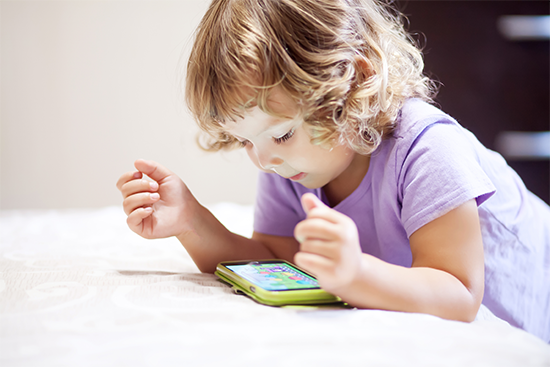
August-
September 2021
Living Lessons
------------------
|





Who's Minding the Kids?
By Judy Combs Puckett
So, what’s the big deal? I’m concerned about the interaction (or the lack of it) between children and their parents. The popularity and convenience of phones, iPads™, iPods™, headphones, gaming, and other technology has increased steadily over the past few years, resulting in an explosion of information at our fingertips. Information overload is stealing precious minutes, even hours, of “face time” from parents and their children.
If you are reading this article in a hard copy magazine, you’re probably not the person who needs it most. You are likely a reader who does not receive 90% of news and information through email, social media, online blogs, and cell phone alerts.
You may not have young children, but you may be a concerned grandparent or relative who sees this trend developing in your own family. Perhaps you have the ability to influence parents of young children, or perhaps you need to avoid finding yourself in the same trap.
The human isolation factor is growing exponentially because all of us—parents, grandparents, friends, and children alike—are becoming more accustomed to a constant barrage of ideas, pictures, information, entertainment, and news on screen. Screen time, as opposed to “face” time, has reached an all-time high, and relationships are suffering as a result.
A 2015 study by the journal Pediatrics on the impact of cell phone usage researched the interaction between family members in restaurants and found children of parents constantly engrossed in their phones were most likely to act out. Even more troubling, other children seemed to accept this lack of attention and quietly entertained themselves, suggesting this had become the normal practice of their family. Observations recorded in 55 situations where children ages ten and under were eating with parents in fast-food restaurants showed 73% of adults used a mobile device during the meal, and most were absorbed or preoccupied by gadgets rather than their kids.
In the analysis of the study, Dr. Jenny Radesky, who specializes in developmental behavioral pediatrics at Boston Medical Center, observed that caregivers highly absorbed in their devices had more negative and less engaged interactions with children. A third of adults observed were on their phones continuously during their meals. When interrupted by their children, they tended to react with anger or irritation—ignoring, scolding, even getting physical with the children. One mother even kicked her child beneath the table.
But parents are not the only ones guilty of excessive screen time. Many children cannot sit still for more than a few moments without access to games and entertainment on their mobile devices. We have trained children to be constantly engaged and/or entertained by technology rather than training them to observe people, activities, and the world around them.

Dr. Manny Alvarez, medical consultant for Fox News, notes, “Humans are really getting addicted to all this technology, and it is destroying the fabric of the family, whether we like it or not.” Dr.
Alvarez observed a child’s vocabulary suffers without regular conversation with parents. They learn much, especially during the first year of life, by watching and listening to parents speak to them in complete sentences, teaching, training, explaining, directing, and helping them to observe voice inflections, emotions, facial expressions, and meaning. If they are not connected verbally and visually while hearing parents speak, they do not bond as well emotionally. They hear words but are socially disengaged with the speaker.
We don’t have to wait for the future to observe the negative impact technology has on the family. The effects of social disengagement are not limited to the parent-child relationship. It has become a common problem in marriage as well. Look around the next time you are at a restaurant, park, mall, ballgame, or some other public space. Observe how many people are engaged with a device rather than other people.
In addition to checking email, talking, and texting, many people feel they must post on social media outlets to let “friends” know where they are and what they are doing, sharing pictures of what they are eating, a concert or play they are enjoying, or even the church service they are attending. When they experience something wonderful, they must “share” that experience immediately. Restaurants, stores, event venues, and even some churches encourage this, and have learned to use it as a free promotional tool. Sadly, that same experience may not be shared with others enjoying the event in person.
It is understandable we have become addicted to our phones since this single device has become a virtual library and more. The smart phone has transformed American culture. It has replaced maps, phone books, dictionaries, and encyclopedias and provides instant games, music, movies, literature—even GPS mapping.
It has become so much a part of our culture that 66% of adults surveyed are afraid to be separated from their cell phones.
If you think you are not guilty, ask yourself a few questions:
-
How long can I go without turning on my cell phone?
-
How much time do I spend in screen time versus face time?
-
How much screen time is actually productive?
-
�How much do I depend on my screen time to enhance my social standing or to make me appear hip, popular, and tech savvy?
Is it possible we are replacing people with phones?
Replacing serious relationships with Siri? Replacing scriptures with a screen? Replacing God with gaming?
No one can determine these things for you, but we should confront ourselves with an honest evaluation of our own patterns. These steps may be helpful for those who need to cut screen time:
-
Set ground rules about using cell phones in family settings, such as mealtimes, travel time, and holidays.
-
Eliminate cell phones while eating out with the family, on dates, and with friends.
-
Take a regular “vacation” from screens for a few hours, a day, or even longer periods to help gauge the personal level of addiction.
-
�Log, compare, and discuss the number of texts, posts, videos, etc. each family member accesses daily. (We will probably be appalled by the number.)
-
Plan (purposefully) family events that require everyone to participate without devices: board games, hiking, picnics, bike rides, outdoor sports (horseshoes, corn hole, croquet, etc.).
-
�Spend deliberate time discussing issues, events, or activities with your children, spouse, or parents.
With so many activities available to most families, face time is already limited, so even a little time carved out for those you love most is meaningful. We demonstrate lack of respect for others when we put our phone or other technology first.
About the Writer: Judith Puckett is a happily married freelance writer with kids and grandkids. She loves writing, surfing the Web, reading, photography, antiques, genealogy, and spending time with friends. Order her book Living by Faith. Find more resources for generational discipleship at D6 Family.
|
|

